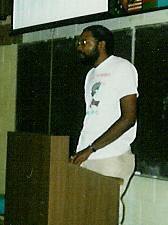
Abayomi Azikiwe at PASU sponsored event on June 14, 1989 at WSU, Detroit. Azikiwe was addressing a seminar on South Africa featuring a representative of the African National Congress.
Originally uploaded by Pan-African News Wire File Photos.
Former WSU revolutionists speak on campus
Markeysha Davis
Contributing Writer
The WSU Chapter of Students for a Democratic Society (SDS) welcomed WSU students and alumni to the Student Center last night for “A People’s History of Wayne State University,” a two-part series on the radical history of WSU.
The WSU Chapter of Students for a Democratic Society (SDS) welcomed WSU students and alumni to the Student Center last night for “A People’s History of Wayne State University,” a two-part series on the radical history of WSU.
Participants discussed movements that changed Wayne State’s campus. The speakers were former students whose activities in the 1960s through the 1980s ranged from the formations of the Chicano-Boricua Studies and Africana Studies departments, student involvement in ending South African apartheid, and the radical development of The South End.
Carmen Mendoza-King, an SDS member and English major, said the purpose of the event was to pay tribute to some former students that changed the university structure but have gone undocumented.
“It’s important to know history, especially about movements that may have happened on campus that we did not know about,” Mendoza-King said.
Dan Aldridge, who attended WSU after graduating from Tennessee State University in 1966, said he has been an activist all his life. He was active with the Student Nonviolent Coordinating Committee (SNCC) and participated in demonstrations for integration of public spheres while a student and resident in Nashville, Tenn.
As a WSU graduate student, he co-founded the Association for Black Students (ABS), which served as a support group and forum for black students. ABS first developed the concept for an Africana Studies department.
“We started talking about developing a black studies department,” Aldrich said. “We organized sit-ins and finally the university gave in.”
In 1989, the university allowed students to develop a black studies department on campus.
Aldridge led the Detroit SNCC and participated in several other demonstrations. However, he noticed there was a lack of connection between the city and WSU.
“Wayne is like an oasis sitting in the middle of Detroit,” Aldridge said. “They are not connected.”
Speaker Abayomi Azikiwe, editor of Pan-African News Wire and a former WSU student who protested South African apartheid, also mentioned the disconnection of the city and the university. But he said that the history of Wayne State should be examined within the framework of Detroit’s history.
“We have to look at WSU in a broader historical context,” Azikiwe said. “The city of Detroit has always been a hot bed for racial issues, as well as labor issues and class issues.”
Azikiwe spoke briefly about the historical significance of WSU to Detroit. He defined the connection between the city and university as economic.
“WSU has been called a working-class university,” he said. “But in many ways it has been shaped by industrialization in Detroit.”
While Aldridge and Azikiwe defined the community as an outside factor in WSU’s history, alumna Marta Lagos said that the community in southwest Detroit was especially critical in the founding of the Chicano-Boricua Studies department.
Born in Detroit to a working-class family, Lagos, now works with the Southwest Detroit Business Association. She considered not going to college to work after her father’s death.
“I thought to myself, ‘College is for the rich and the smart,’” Lagos said. “I could not do it.”
She received word that three Latino professors worked at WSU and would offer support for incoming Latino students. Taking a chance, she quit her job and 39 other Latino students got together and petitioned for a program called “Latinos en Marcha,” or “Latinos on March.”
The plan of the Latino student group was to be admitted together, and they were promised a stipend. However, during a meeting, a professor gave them the news that they would be admitted separately and that chances for a stipend were slim. The students protested to the university and the dean of students until they were admitted to the university, and given the support they were promised. The Chicano-Boricua Studies department was founded in 1970.
“There were many struggles and many demonstrations,” Lagos said. “We protested for classes that were relevant.
“We determined that once we heard about our history and owned it, we could really relate to it and find our grounding.”
Charles Simmons, a founder of the radical black student group UHURU (a Swahili word for “freedom”), found his grounding in both campus and community activism and journalism.
After being dismissed from the Air Force in 1962, he came to WSU. As both a laborer and student, he said that he could relate to both the issues of black college students and the black people in Detroit.
“(UHURU) focused on community issues, like police brutality and unemployment,” Simmons said. “At first we didn’t focus on university issues too much.”
Simmons said that from UHURU came the League of Revolutionary Black Workers (LRBW), the organization responsible for radicalizing Wayne State’s student newspaper, The Daily Collegian, and renaming it The South End in 1967. The South End’s first editor, the late John Watson, was Simmons’ roommate. After its restructuring, the paper covered issues on campus and in the city, including racial discrimination.
Simmons said activism of students on campus has always been important and remains relevant today. Despite low numbers, he said that student-activist organizations should continue to work for their respective causes.
“It is important to connect with student groups of all types, organizing for justice and peace,” Simmons said. “Try to implement everywhere and anywhere. This is what the best youth are doing today.”
“A People’s History of Wayne State University” continues today in Student Center, Room 261 at 5 p.m.
No comments:
Post a Comment